Research Round-up – May 2019
Welcome to the latest instalment of our new monthly feature series throwing the spotlight on our research success stories.
Dr Oluwapelumi Adeyemi, a former PhD student and now a research visitor at Leeds, is hoping research at Leeds will one day allow him to investigate vaccines for some of the diseases in his home country, Nigeria

The strength of our research is in making a real and telling difference to the world around us, by working across traditional boundaries to find innovative solutions to some of the greatest challenges facing society today.
Here we highlight some of latest projects being pioneered by the expertise and efforts of the highly talented research community at Leeds.
From grant awards to examples of outstanding interdisciplinary work and best practice, we’re keen to showcase your research achievements. See the foot of this article for details of how you can get involved.
Featured in this month’s round-up:
- Northern universities to tackle transport emissions
- Nearly a quarter of West Antarctic ice is now unstable
- Nexus partners with CBI to unveil major new report
- Finding a safer way to make the Polio vaccine
- Seeing into the detail of muscle structure
- Chancellor and Vice-Chancellor to open revamped Priestley Building
- Prestigious honour for postdoctoral researcher
- £1.3m grant to maximise impact of social science research
- ‘Surgery’ to support pedagogic research to open
- Research Spotlight video
- How to feature in future round-ups

Northern universities to tackle transport emissions
Leeds scientists are leading a research network of northern universities to find new ways to rapidly decarbonise UK transport.
The DecarboN8 network will focus on tackling surface transport emissions, which form 26% of the UK’s greenhouse gas emissions. These include emissions from cars, vans, buses, heavy goods vehicles and trains.
It will also examine emissions from the construction and maintenance of these vehicles, as well as infrastructure.
The network, worth £1.25 million and funded by the Engineering and Physical Sciences Research Council (EPSRC), is made up of experts from the N8 Research Partnership – a collaboration of the eight most research intensive universities in the North of England, including Leeds – as well as experts from Government and industry.
Tackling the decarbonisation of transport is complex, partly because different places – from rural environments to stand-alone towns to dense urban areas – require different approaches.
The North is an ideal area for this research as it has a wide range of locales, socio-economic circumstances and travel patterns.
The project will look specifically at how different places could be rapidly switched to electromobility for personal travel, and how different decarbonisation strategies needed for cars and heavy vehicles can interact with each other.
Read more about the project, which will be led by Professor Greg Marsden, from the Institute for Transport Studies at Leeds.
 Antarctica’s ice sheet has thinned rapidly during the past 25 years
Antarctica’s ice sheet has thinned rapidly during the past 25 years
Nearly a quarter of West Antarctic ice is now unstable
Ocean melting during the past 25 years alone has caused ice thinning to spread across West Antarctica so rapidly that 24% of its glacier ice is now affected, according to a new study.
By combining 25 years of European Space Agency satellite altimeter measurements and a model of the regional climate, the UK Centre for Polar Observation and Modelling (CPOM) have tracked changes in snow and ice cover across the continent.
A team of researchers, led by Professor Andy Shepherd from the School of Earth and Environment at Leeds, found that Antarctica’s ice sheet has thinned by up to 122 metres in places, with the most rapid changes occurring in West Antarctica, where ocean melting has triggered glacier imbalance.
This means the affected glaciers are unstable as they are losing more mass through melting and iceberg calving than they are gaining through snowfall.
The team found the pattern of glacier thinning has not been static.
Since 1992, the thinning has spread across 24% of West Antarctica and over the majority of its largest ice streams – the Pine Island and Thwaites Glaciers – which are now losing ice five times faster than they were at the start of the survey.
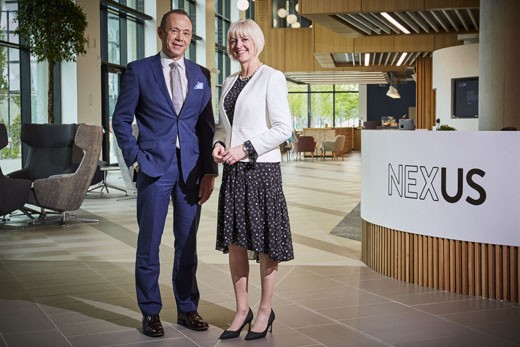 Nexus Director, Dr Martin Stow, and Professor Lisa Roberts, Deputy
Vice-Chancellor: Research and Innovation, in Nexus
Nexus Director, Dr Martin Stow, and Professor Lisa Roberts, Deputy
Vice-Chancellor: Research and Innovation, in Nexus
Nexus partners with CBI to unveil major new report
Advanced data analytics is opening up a ‘new frontier’ for business Research & Development, according to a new report from Nexus and the CBI.
The report reveals that businesses are facing unprecedented advances in data-driven technologies and outlines the vital role universities play in helping harness the power of data.
The report was the focus of discussion at the special opening of Nexus, our innovation hub, where the CBI and Leeds join forces to present the findings to senior UK business leaders, funders and regional stakeholders.
Professor Lisa Roberts, Deputy Vice-Chancellor: Research and Innovation said: “The CBI/Nexus report shows the extraordinary opportunities for UK businesses to harness data for R&D, as well as the vital role universities have to play in supporting innovation and productivity.
“Unlocking this potential will supercharge R&D and that’s why we’re making a step-change at Leeds in how we work with business.
“This is what Nexus, our innovation hub, is all about – giving businesses seamless access to this support. There has never been a better time for universities and businesses to collaborate.”
See For Staff for the full story.
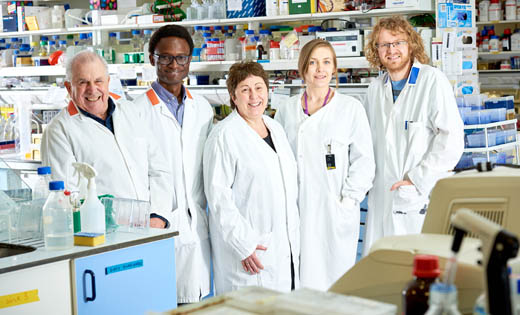 Researchers at Leeds, who are developing a cheaper and safer way of making the
polio vaccine
Researchers at Leeds, who are developing a cheaper and safer way of making the
polio vaccine
Finding a safer way to make the Polio vaccine
Researchers at Leeds are developing a cheaper and safer way of making the polio vaccine.
The pioneering work is featured in the latest MadeAtUni campaign, a celebration of the pioneering research taking place in UK universities.
The focus of the campaign is scientists involved in health research and innovation.
The Leeds’ team, from the Faculty of Biological Sciences, has shown that the polio vaccine can be manufactured from harmless virus-like particles, doing away with the need to use a live virus, which carries the risk of the virus escaping.
Professor Nicola Stonehouse, who is leading the project with Professor Dave Rowlands, said: “Virus-like particles are proteins that stimulate the body’s immune system in the same way as a virus – in effect, they trick the body into thinking they are the virus.
“Scientists have recognised the possibility that they could be used instead of a live virus in vaccine production but the problem is that some can be unstable.
“At Leeds, we have successfully developed a process which involves engineering polio virus-like particles in yeast – and the next stage is to see if we can make this work on an industrial scale.
“If we can, polio virus-like particles will become attractive to the pharmaceutical industry as a safer alternative to using a live virus.”
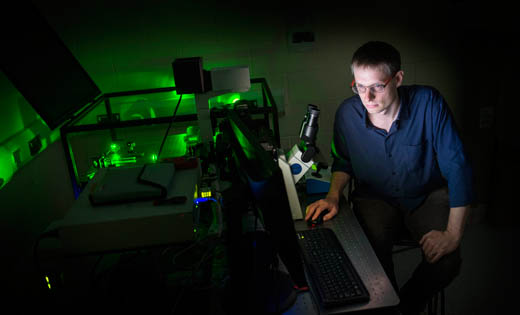 Physicist, Dr Alistair Curd, next to the super-resolution microscope
Physicist, Dr Alistair Curd, next to the super-resolution microscope
Seeing into the detail of muscle structure
More than £800,000 in funding will help a research team from Leeds ‘see’ further into heart muscles than ever before.
Skeletal and heart muscle are essential for movement of limbs and for pumping blood around the body.
Proteins that are important for the structure and function of these muscle cells are highly organised in a very regular pattern, and this is critical for their function. Many diseases affect these proteins, but without knowing how they are organised in muscles, it can be difficult to understand the disease process.
Michelle Peckham, Professor of Cell Biology at Leeds, has teamed up with Associate Professor and biochemist, Dr Darren Tomlinson, and Research Fellow, Dr Alistair Curd, who is a physicist, to tackle this problem.
And an £807,228 Biotechnology and Biological Sciences Research Council (BBSRC) will fund their three-year research project.
Professor Peckham said: “We’d really like to understand how the proteins in regular repeating structures – called ‘Z-discs’ – in skeletal and heart muscle are organised. About 50 different proteins are packed into a narrow structure just about 100 nanometres wide. This makes it difficult to use standard light microscopy imaging techniques, as the structure is smaller than the normal amount of detail (or resolution) we can ‘see’.
“In this new work, we will use ‘super-resolution’ microscopy to ‘see’ to at least 10 times greater detail, together with pattern recognition software to understand how proteins are organised in Z-discs.”
Professor Peckham added: “Dr Tomlinson will be helping us isolate novel small non-antibody binding proteins called Affimers, which allow us to fluorescently label proteins in the Z-disc to be able to see them. These have the advantage that they put the label very close to the protein, so we can be more certain about where it is.
“Dr Curd is building and improving our super-resolution microscope, and will be developing his pattern recognition software to enable us to uncover the pattern of organisation of proteins within the Z-discs. Francine Parker (a biologist) will be working alongside me to prepare the samples for imaging.
“It was very exciting to obtain this funding from BBSRC, as it will allow us to ‘see’ inside the Z-disc for the first time, and understand its structure. It allows us to develop our cutting-edge super-resolution imaging approach, which is strengthened by the use of Affimers, unique to Leeds.”
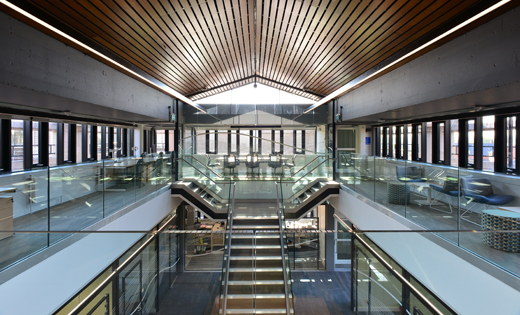 Inside the revamped Priestley Building following a 13-month works programme
Inside the revamped Priestley Building following a 13-month works programme
Chancellor and Vice-Chancellor to open revamped Priestley Building
Colleagues are invited to attend the formal opening of the Priestley Building – the new home of the Priestley International Centre for Climate at Leeds.
Chancellor, Professor Dame Jane Francis, and Vice-Chancellor, Sir Alan Langlands, will perform the official honours on Monday 24 June, to be followed by a drinks reception.
You can register to attend the event, which takes place from 4-5pm on Level 10 of the Priestley Building.
And not only are colleagues invited to attend the ceremony, they are also encouraged to become members of the Priestley Centre.
With a focus on solutions-based interdisciplinary climate research, the Priestley Centre facilitates collaboration both across campus and with international colleagues.
The official opening forms part of a week-long programme of activities, including:
- Piers Sellers prize-giving and lectures, which includes a keynote speech from 2019 prize winner, Professor Petra Tschakert – Monday 24 June, 2-3.15pm, Clothworkers Central Building Speakman Lecture Theatre (G.89)
- a seminar from Professor Tschakert – Tuesday 25 June, noon to 1pm, School of Geography Seminar Room 2 (Garstang Building, room 8.11)
- a talk about The Life and Times of Joseph Priestley – Wednesday 26 June, noon to 1pm, Clothworkers Central Building Speakman Lecture Theatre (G.89); and
- A Laughing Matter? Comedy and Climate Change – Thursday 27 June, 5.30-7pm (venue TBC). Join comedian Gemma Arrowsmith to examine the unlikely intersection of comedy and climate change.
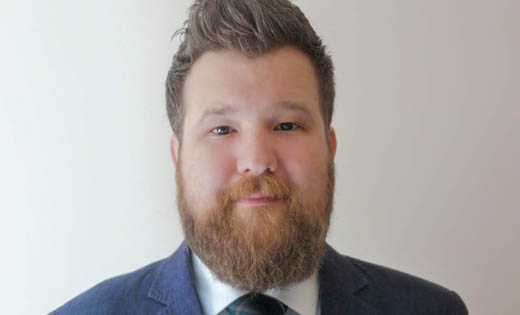 Postdoctoral Researcher, Dr Fraser Macrae, who has been awarded a prestigious Sir Henry Wellcome Fellowship
from the Wellcome Trust
Postdoctoral Researcher, Dr Fraser Macrae, who has been awarded a prestigious Sir Henry Wellcome Fellowship
from the Wellcome Trust
Prestigious honour for postdoctoral researcher
Dr Fraser Macrae from the School of Medicine has been awarded a prestigious Sir Henry Wellcome Fellowship from the Wellcome Trust.
The Fellowship offers recently qualified postdoctoral researchers the opportunity to start independent research careers, working in some of the best research environments in the world.
Dr Macrae’s research will focus on his recent discovery of naturally forming protein films on the surface of open wounds that prevent the movement of microbes into the body. During the Fellowship, he will explore the mechanisms behind the film’s antimicrobial properties and if these films can be exploited to improve wound healing.
Dr Macrae will spend time in leading laboratories in his field in Sweden and Edinburgh, learning new techniques that will help uncover the potential of these films.
He said: “It’s great to be awarded this Fellowship. It will provide me with a great opportunity to develop my independent research career and experience working in different laboratories.
“I am excited to continue my research into these bio-films, and I believe breakthroughs in this field will lead to the development of therapeutics to improve wound healing.”
£1.3m grant to maximise impact of social science research
Leeds Social Sciences Institute (LSSI) is celebrating after securing a £1.3m grant.
The Economic and Social Research Council (ESRC) award – the largest given to any university in the UK – was made to LSSI through an Impact Acceleration Account (IAA). It will support Leeds researchers in the social sciences to maximise the impact and influence of their research on non-academic beneficiaries and to foster non-academic stakeholder engagement.
The IAA – for which Professor Adam Crawford is Principal Investigator – will support a comprehensive portfolio of activities and resources across the social science community, which will maximise the potential for impact of its research and contribute to economic and societal development regionally, nationally and internationally.
The ESRC IAA will allow Leeds to build on the successful University-funded IAA that the LSSI has coordinated since 2015.
The objectives of the IAA are:
- to embed training and development opportunities and build capacity in impact-related skills and understanding
- to coordinate and maximise support for social science impact activity to provide responsive, flexible funding for innovative social science impact projects
- to build new and enhanced relations with partners in the industrial and business sectors and to diversify and strengthen relations with organisations in the third sector at regional, national and international levels; and
- to embed the social science IAA within wider interdisciplinary institutional impact activities and programmes, including those aligned to EPSRC/Natural Environment Research Council (NERC), the Themes and Platforms at Leeds and Nexus, our innovation hub.
‘Surgery’ to support pedagogic research to open
A rolling one-stop-shop for all your pedagogic research (PedR) needs is to open its doors at the Leeds Institute for Teaching Excellence (LITE) next week.
The LITE PedR surgery will provide informal guidance and support to any member of staff at Leeds on any aspect of a pedagogic research project. It will be held on the first Monday of every month, starting on 3 June, from 2-3pm in the LITE meeting room, 18 Beech Grove Terrace.
Subjects sought for advice could include: feedback on a research idea; guidance on data gathering; how best to share and disseminate work, or how best to demonstrate impact.
This is the latest announcement by LITE following on from the recent launch of the LITE Journal Club and the Research-based learning Network, as part of the Institute's popular and expanding community offer.
Professor Tina Overton, LITE Director, said: “Given the huge response we’ve had so far to the ‘Getting started in pedagogic research’ workshops, we hope a LITE PedR surgery may also be a useful opportunity for staff to touch base on the many aspects of this type of research.
“So, if you have any burning PedR questions you would like to discuss further, we look forward to seeing you at our surgery.”
Email Katie Livesey with a brief outline of the support you require. If you are unable to make the surgery, email the LITE team, which will be happy to find a suitable alternative.
Research Spotlight video
Learn more about some of the incredible work taking place at Leeds in our new Research Spotlight video, available on Twitter, Facebook, YouTube and LinkedIn.
How to feature in future round-ups
Please contact Internal Communications if you or one of your colleagues would like to appear in this monthly feature.
Posted in: University newsResearch and innovation